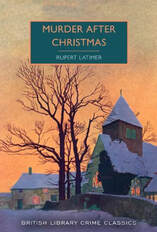
In Christmas, Frank and Rhoda Redpath await the yuletide arrival of Rhoda’s rich and eccentric stepfather, Sir Willoughby Keene-Cotton, dubbed more ironically than affectionately “Uncle Willie”. The couple exchange winking ideas about how best to dispose of their relation to gain an inheritance, and as often happens in this type of story, Frank and Rhoda soon find themselves hosting other guests and relatives that could stand in the way of obtaining Uncle Willie’s legacy. When the designated victim finally meets his end – his body is found outside in the snow, lying beside a snowman that contained a box of chocolate as part of a holiday scavenger hunt – it is up to Superintendent Culley to interview the suspects, sort through the colorful clues, and make sense of it all.
I sincerely wish I had responded more favorably to Latimer’s prose, plotting, and characters. Other reviewers seem to have done so, from Kate at crossexaminingcrime, who enjoyed the book’s humour and characterizations, to Sarah over at On: Yorkshire Magazine, who found the book “charming and delightful”. My disappointment stems from the author’s handling of the genre’s three crucial elements: I found the prose forced and overwritten, the puzzle’s late-chapter twist telegraphed from the start, and the characters and investigation wearying over time.
And yet it shouldn’t be so. Latimer has worked hard to adopt a buoyant, comic worldview that should be inviting, not off-putting. And it’s very possible that this prose engages some readers; it just doesn’t cast the same spell over me. Instead, I find myself wading through the words, encountering phrases that often require a cerebral translation before I’m able to form a picture. Often it feels like the author is constructing his sentences and shaping his tableaux in an effort to display his very determined wit. Consider the passage below; to me, it feels too calculated and puckish to truly bring these characters to life.
The Coultards arrived first of all, with their two horrid little boys; then came the Howard Wortleys, with Esther Hobbs and three well-washed, adolescent evacuees. Rhoda tried to stir up these preliminary guests to be going on with, but they weren’t immediately mixable. The Coultards accepted the Wortleys as equals, but the Wortleys weren’t able to place the Coultards at all, having merely been told that he was a schoolmaster, which gave him no social status at all. Mrs. Coultard, well-dressed, stout, and cheery, bustled about helping Rhoda and calling her my dear (but in Scotch, which told one nothing), while Mr. Coultard referred to Frank and Howard as Sir (but in a cherubic and public-school sort of way, which told one even less).
I get it, you say (and rightly so). You don’t like his writing style. It’s not to your taste. So what else? As Martin Edwards and other reviewers note, Latimer’s references to British country life during wartime give the story a welcome angle of interest and lend an authentic anchor to an otherwise fantastical plotline. As a reader, though, it was frustrating to be able to guess the “twist” element and the underlying motive for the actions creating the “twist” almost as soon as poor Uncle Willie’s body is discovered. I claim no special perspicacity at all; indeed, I’m easily bamboozled by these things. But the author leads us there with the book’s title and then underlines the concept by having his characters discuss a certain pertinent issue again and again. At least Rupert Latimer cannot be accused of hiding clues or sidestepping fair play.
Such an early but strong suspicion of the solution meant that I felt consistently ahead of the ruminating Superintendent Culley, who pushes through 100 additional pages before arriving at the same conclusion. It gave me time to ponder another weakness in this lengthy mystery story: after Uncle Willie’s demise, Latimer never complicates his plot by adding another victim to the roster, thus injecting some energy into an otherwise flagging story. There is the offstage death of another relative – by natural causes or foul play? – and I did enjoy some of the singular clues, such as mince pies sown into a seat cushion and the disappearance of a detective novel called… Murder after Christmas. The story has potential, and at half its length and stripped of its jungle of prose it would be a fun seasonal read. Like those mince pies, I think it’s ultimately a matter of taste.
I received an advance reading copy of Murder after Christmas from NetGalley in exchange for an honest (perhaps too honest) review.
 RSS Feed
RSS Feed